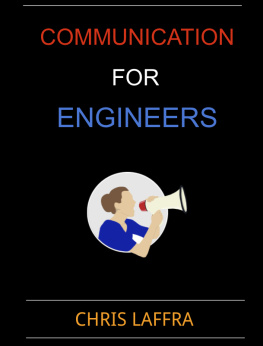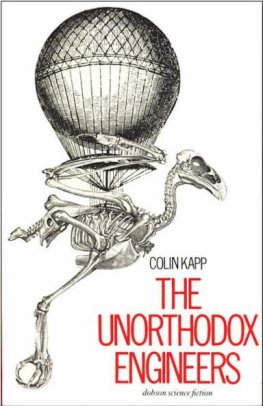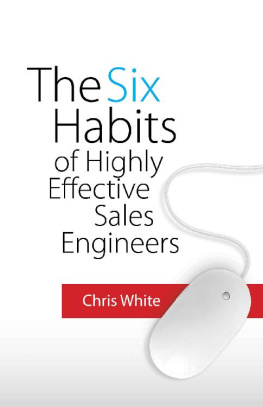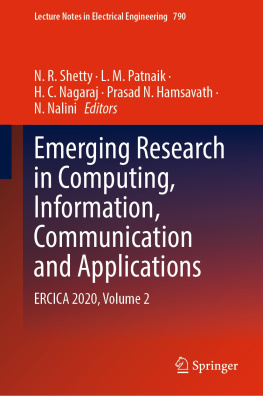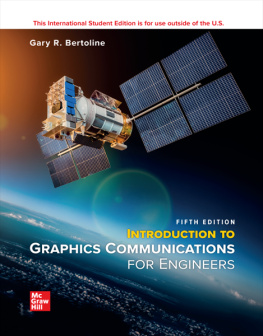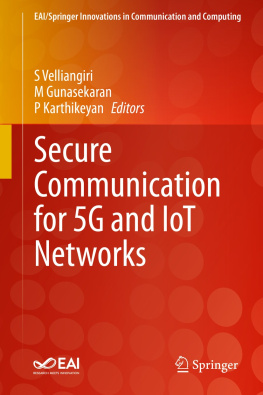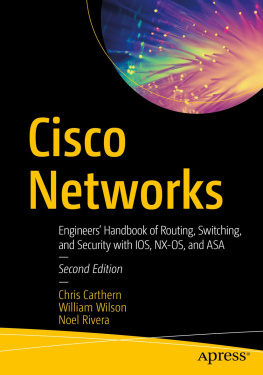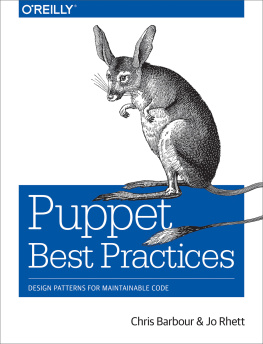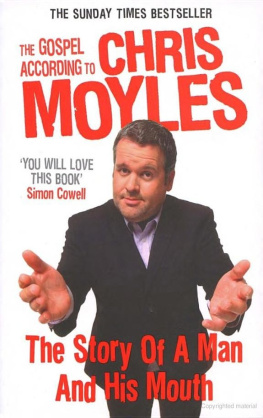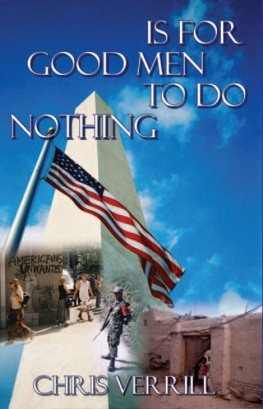Chris Laffra - Communication for Engineers
Here you can read online Chris Laffra - Communication for Engineers full text of the book (entire story) in english for free. Download pdf and epub, get meaning, cover and reviews about this ebook. year: 2021, genre: Computer. Description of the work, (preface) as well as reviews are available. Best literature library LitArk.com created for fans of good reading and offers a wide selection of genres:
Romance novel
Science fiction
Adventure
Detective
Science
History
Home and family
Prose
Art
Politics
Computer
Non-fiction
Religion
Business
Children
Humor
Choose a favorite category and find really read worthwhile books. Enjoy immersion in the world of imagination, feel the emotions of the characters or learn something new for yourself, make an fascinating discovery.
- Book:Communication for Engineers
- Author:
- Genre:
- Year:2021
- Rating:3 / 5
- Favourites:Add to favourites
- Your mark:
- 60
- 1
- 2
- 3
- 4
- 5
Communication for Engineers: summary, description and annotation
We offer to read an annotation, description, summary or preface (depends on what the author of the book "Communication for Engineers" wrote himself). If you haven't found the necessary information about the book — write in the comments, we will try to find it.
Communication for Engineers — read online for free the complete book (whole text) full work
Below is the text of the book, divided by pages. System saving the place of the last page read, allows you to conveniently read the book "Communication for Engineers" online for free, without having to search again every time where you left off. Put a bookmark, and you can go to the page where you finished reading at any time.
Font size:
Interval:
Bookmark:

For Carla, who has always supported me when I was chasing my dreams.
I would like to take the time to thank all my past colleagues at OTI, IBM, Morgan Stanley, Bank of America, Google, and Uber. I have been privileged in my tech career, and I was fortunate to have spent time with so many colleagues who turned into friends as time progressed. From many of you, I have learned how to be a better communicator. Sometimes, I did this by merely observing you as a role model. On other occasions, you mentored me in 1:1 sessions. Without all of you, this book would not exist.
My writing career began in earnest while doing my Ph.D. at Leiden University in the same group as Hans Jense, Peter van Oosterom, and Remco Veltkamp. You three were the first real team I was part of, as students under Prof. van den Bos. I could not have wished for a better set of people to start growing my technical and communication skills.
In that same Leiden period, I also edited a book, together with Edwin H. Blake, Vicki de Mey, and Xavier Pintado. Thank you three for laying a foundation of communication skills that I could leverage later in my career.
The last two years of my Ph.D. I spent at SERC in Utrecht. So much I learned there on the topics of communication, interacting with stakeholders, and even organizing a real conference, ECOOP'90. Gert Florijn, Eugene Bogaart, Paul Hendriks, Anco Smit, and Theo de Ridder: I really enjoyed our daily walks to pick up our "Broodje Mario".
I started my engineering career at IBM T.J. Watson Research Center in the company of countless communication experts. One person, John Vlissides, has been particularly influential in that early phase of my career. John was wise for his young age, a great coach, and an enormous role model to me. A great dad, husband, and author was taken from us way too early.
Thank you, Jeff Birnbaum, for believing in me and offering me a job with Morgan Stanley. You created a fantastic collaborative team that I was so happy to join. I learned so much in that time, and I appreciate the encouragement you gave me to work on my first book. I also owe special thanks to Kevin Parker for sponsoring my writing and keeping my Java book at his desk for everyone to see.
Brian Barry and Dave Thomas of OTI, I am grateful for your leadership and coaching. So much of your leadership came down to providing your teams with autonomy, clear communication, and a healthy emphasis on creating the perfect, creative development culture that many large companies are still searching for today.
Thank you, Mike Dubno, Kirat Singh, and the rest of the Quartz team at Bank of America. I learned so much about Quartz by combining my technical contributions on the project with being the developer advocate on the project. The learning by doing I did by creating the training materials taught me so much. Thanks for creating this great project and letting me be a part of it.
At Google, I worked with many fantastic people, too many to mention. Three stick out. First, Ronald Laeremans, thank you for coaching me on writing project proposals and being a sparring partner while exploring innovations. Chapter 13 discusses planning, where I talk about Product Managers. You acted as an inspiration when I wrote that. Secondly, Clive McQueen, thank you for being such a role model on the topic of active listening and mentoring. Finally, Urs Hlzle, it was always a pleasure working with you at Google. Your comments about reading and writing being superpowers at a fire-chat at Uber directly encouraged me to write this book.
At Uber, I would like to thank all my students for the C4E class for allowing me to use you as guinea pigs. Those class materials have finally turned into the book you are reading right now. Thank you, Praveen Murugesan, for your wisdom and guidance on so many occasions. Shatlyk Ashyralyyev, thanks for taking me on walks along the Amstel river to check out those ducks. Simon Soriano, your enthusiasm gave me the strength to pick up this project and see it to a successful conclusion. One of these days we will write a book together, I am sure. Berik Visschers, thanks for your in-depth feedback on the manuscript. All remaining issues with the book are totally my fault.
This book was self-published, so I have no editors to thank for their patience and prodding while I did not write on the book for a whole year. Instead, I want to thank the authors and contributors to Pandoc. Your beautiful tools allowed me to write a book in Markdown using VIM and VSCode and quickly generate formats, such as epub, and docx.
Han Tammer, thanks for being my life coach, travel companion, golf buddy, and overall long-time friend. You are always positive and encouraging.
Last but not least, Carla Laffra, thanks for being my better half. You have always supported me in my dreams, following me to the US and Canada twice in our lives, and always encouraged me to be happy at work. Thanks for never stopping to believe in me and for all your support, especially this last year, when writing this book.
Being able to communicate effectively is one of the most crucial life skills to learn. Through communication, we transfer information to produce a greater shared understanding. Communication is multi-faceted. You can share information verbally or through written media, such as books, websites, and documents. You can enrich your communication visually using graphs, charts, images, and maps. Finally, you can complement the message with non-verbal communication such as body language, gestures, tone, and voice pitch.
As software engineers, we care a lot about our code. It defines us. We study the programming languages we use in great detail. We become experts in the tools we deploy. We argue with other engineers who are not using the same editors we use. In college, we learn how to write compilers. We learn multiple programming languages, frameworks, and design patterns. A large majority of our formal education draws our focus on these technical topics. We see the same in informal discussions between software engineers.
However, softer skills get less attention. Some examples: How to collaborate, how to achieve consensus on an idea, how to articulate our thoughts, how to make meetings effective, and how to listen to others. The more senior you become, the larger your scope of influence, and the less you can communicate effectively just by talking with others.
Stand-ups, planning meetings, and peer programming sessions all have their physical limits. This effect applies sooner than you think. At that point, you need to pivot to asynchronous communication: you need to switch to writing. Those who can write well suddenly have a significant advantage. Through well-written communication, your words and thoughts can influence hundreds or even thousands of people.
If writing is a superpower, I am not sure what we would call reading. Perhaps, a hyperpower. To become excellent at writing, you need to read a lot. Reading provides you with different perspectives and insights. Reading faster helps you process information faster, allowing you to make more informed decisions. Most successful people are voracious readers. If there is any advice I can give you as a fellow engineer, read more. This book gives the same advice.
The communication in a company naturally forms a graph, with people as the nodes and interactions (emails, meetings, documents, code) as edges. In the communication graph, highly productive individuals look like super-nodes, with many edges: lots of information flows through them and from them. The supernodes bridge different clusters in the graph and allow information to reach otherwise disconnected parts. What enables these exceptional individuals to become so successful? Exceptional communication skills.
Font size:
Interval:
Bookmark:
Similar books «Communication for Engineers»
Look at similar books to Communication for Engineers. We have selected literature similar in name and meaning in the hope of providing readers with more options to find new, interesting, not yet read works.
Discussion, reviews of the book Communication for Engineers and just readers' own opinions. Leave your comments, write what you think about the work, its meaning or the main characters. Specify what exactly you liked and what you didn't like, and why you think so.

